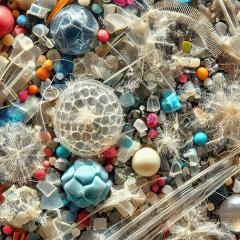Exploring the nanoscale surface interactions of microplastics in natural waters
Microplastics are now ubiquitous in aquatic ecosystems. As such, any impacts microplastics are having on these ecosystems should be of significant interest and concern. Although a significant amount of research has been done in recent years on the impacts of microplastics, much of this has been on environmentally irrelevant microplastic material. This is significant as the properties of microplastics change in natural waters. They become fragmented, and coated in biological material as well as various chemicals present in the environment. This all has an impact on how microplastics behave in, and impact the aquatic environments they pollute. In this short seminar, the plan for this QUEX Institute project to address this will be presented. Looking at how microplastic characteristics develop in natural waters using various modern methods (from Whispering Gallery Mode optical nanosensors to high-speed atomic force microscopes). Ultimately, quantifying nanoscale surface interactions on microplastic surfaces to develop more understanding about their impact on aquatic ecosystems.
Stephen Burrows is an early career British marine scientist driven to contribute to marine conservation through effective research and communication. He studied to gain a first-class Bachelors degree with Honours in Marine Biology from Bangor University (Wales) in 2016 and a Distinction level Masters degree in Sustainable Aquaculture from the University of Stirling (Scotland) in 2017. These qualifications provided Stephen with a strong knowledgebase and skill-set relating to both marine ecosystems and marine industry. He is now working towards his PhD, jointly based between the University of Queensland (QAEHS) and the University of Exeter (England), titled "Exploring the nanoscale surface interactions of microplastics in natural waters". With this project he's hoping to further understanding about how variation in the surface layers of microplastics in natural waters (eco-coronas) influence their behaviour in and impact to aquatic ecosystems.

